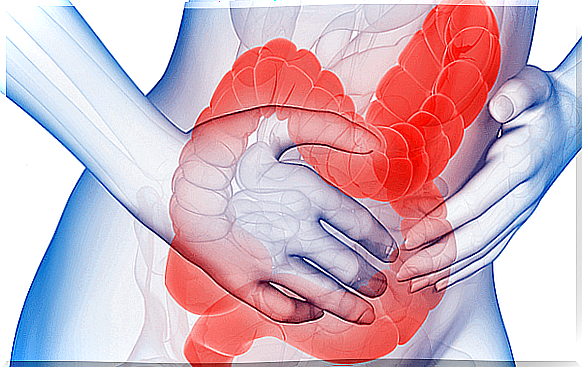The Relationship Between Stress And Irritable Bowel Syndrome

An increasing number of tests and clinical studies now show a relationship between stress and irritable bowel syndrome (IBS). This gastrointestinal condition affects almost 10% of the population, many of them women. Psychological strategies for emotional coping can really improve the quality of life for people with IBS.
We still do not understand exactly how stress can affect our gut health so strongly. But studies like the one from New York State University in Albany reveal something quite interesting.
More than 60% of people with anxiety disorders also have irritable bowel syndrome. Researchers believe that this condition is another example of the complex biological relationship between the brain and the gut.
This disease is also the most common digestive problem. So many patients are jumping from specialist to specialist and still cannot find an effective solution. Therefore, it is especially important to consider the psychological factor. A new perspective, together with diet and medication, can hopefully help create an effective treatment plan.

The relationship between stress and irritable bowel syndrome
Now the medical community is more accepting of the relationship between stress and irritable bowel syndrome. There are some who believe that psychological factors intensify the disorder, but that they are not a contributing cause. In that case, stress will increase the movement and contractions of the gastrointestinal tract abnormally.
Other specialists believe in the theory that our emotional and mental problems change our immune system. The body’s natural immunity changes so much that it provokes an inflammatory response in the intestinal mucosa. The changes will manifest themselves in the symptoms that constitute irritable bowel syndrome. Let’s see what the most common clinical presentation of IBS is:
- Sharp, painful stomach cramps. This pain can be moderate to mild and last a few hours.
- The patient has some periods of constipation and others with diarrhea.
- Constant intestinal gas.
- Quick feeling of satiety. The patient feels full after eating only a little.
- Nausea, vomiting and a burning sensation in the chest.

What helps against irritable bowel syndrome?
We know that there is a clear relationship between stress and irritable bowel syndrome. Now we do not have enough evidence to know if stress causes IBS or just intensifies it. However, there are certain factors that have been shown to be related.
Genetics play a role in the occurrence of the syndrome. In other words, if your mother suffers from irritable bowel syndrome and you are a woman, you are more likely to get IBS.
We also know that following a specific diet can improve IBS. So, if you follow your doctor’s guidelines and keep stress at bay, your quality of life will improve. Also, do not forget that irritable bowel syndrome can really limit a person’s life. They may miss out on social activities, and sometimes even work. It is a silent pain that deserves greater visibility and sensitivity.

Guidelines for improving irritable bowel syndrome
It is important to be aware that your gut acts as an emotional barometer. Everything that worries the brain also has an effect on the intestinal membrane. Stress and anxiety affect intestinal inflammation, motility and general health.
- So it is a very good idea to try to deal with your stress better. Clarify your priorities. Remember what your needs are. Give yourself time and use proper breathing and relaxation techniques.
- Physical exercise is another factor that will improve your gut health. In light of this clear relationship between stress and irritable bowel syndrome, you should always keep in mind the importance of exercise. Something as simple as going for a walk can help in a big way.
- Eat a diet that is low in FODMAPs (simple sugars, dairy and wheat).
- Reduce the consumption of fats, caffeine and processed foods.
- Stay hydrated.
- Eat slowly. Small meals five times a day are preferable.
- Eat probiotic and prebiotic foods.
Given that an increasing number of people suffer from irritable bowel syndrome, this information is important. Before resorting to medication, it is always best to try to promote healthy habits. Managing stress, taking time to rest, having a healthy diet and practicing relaxation techniques can help you feel better every day.
References:
Stress, Anxiety and Irritable Bowel Syndrome – New York State University









